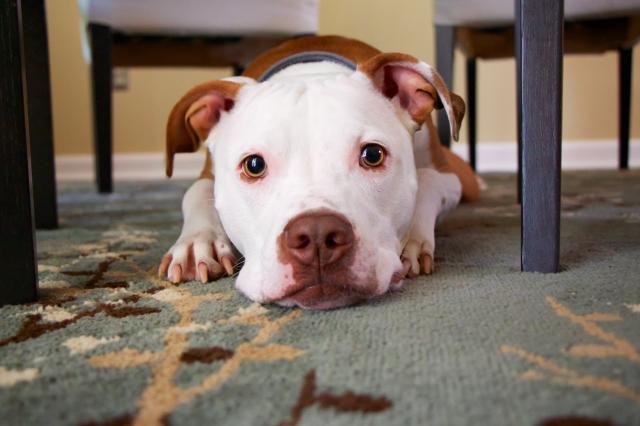
Animal ecologist Dr Joy Tripovich, a UNSW Science research fellow with an interest in animal behaviour, welfare and sensory ecology, shared some tips on how you can help your pet cope with loud noises this holiday season:
1. Make sure they can’t flee
Pets often try to run away during storms and fireworks, but it doesn’t mean they don’t love you – in fact, it can be a normal reaction to a perceived danger.
But running away can be dangerous for the animal, so Dr Tripovich says it’s important to make sure they can’t get out.
“You don’t want them getting out on the road, so make sure the fence or gate is secure,” she said.
“If they somehow do escape, you want to ensure they can safely get back home, so make sure they’re wearing their collar and keep your contact details on their microchip up-to-date.”
2. Provide a safe space for your pet
The next step is to give your pet a safe space at home.
“Providing a safe space for your pet is very important,” Dr Tripovich explained.
“This can either be a room or a crate that you’ve trained them in.”
Whatever space you choose, you can make it feel even safer by obstructing the noises in some way, for example by playing TV or calming music.
“A dark space without many windows could also be beneficial,” she said.
3. Try to tire them out beforehand
If you know fireworks or storms are coming, it can help to first tire out your pet with exercise.
“Exercise can help your pet expend their energy before the storm comes,” Dr Tripovich said.
“Tiring a dog out mentally and physically could lead to a calmer dog.”
4. Stay calm
Pets tend to feed off our cues.
But if we’re present and calm during the storm or firework episode, we can help reassure them there’s nothing to worry about.
“Animals will cue in on our behaviour,” Dr Tripovich said.
“We can help alleviate their stress by not responding to the loud noises in a fearful manner ourselves.”
5. Desensitise them
Desensitising your pet to the stimuli can be another useful stress management technique.
You can do this by playing thunder/firework sounds while your pet is in a good mood – perhaps while enjoying a bone or treat – and in a safe, comfortable environment.
“Desensitisation can be a way of reassuring your pet that nothing bad is going to happen to them when they hear this sound,” she said.
“Although, you would only want to try this technique away from the episode of a storm.”
6. Train them young, if you can
Not all pets get stressed during storms – for example, you might have one dog snoozing happily in their bed while another is panicked and hiding in a corner of the house.
While it’s not fully understood why individual animals respond in certain ways, Dr Tripovich says it could be related to the animals having an early exposure to these loud sounds.
So, if you have a puppy or a kitten, you have an extra chance now to help set them up for a stress-free future.
“Early exposure with no negative association is good training for our pets,” Dr Tripovich explained.
“The first 16 weeks of a puppy’s life is the most important time to get them learning about these things.
“For kittens, it’s even earlier – around seven to eight weeks.”
7. If their fear is strong, see your vet
Lastly, Dr Tripovich says to never forget your first port of call when it comes to your pet’s health: their vet.
“Long term stress is unhealthy, so if your pet is having such a strong reaction to these events, I suggest speaking to your vet,” she said.
There are a number of other measures that the vet might suggest, for example, pheromones, anti-anxiety medication, or thunderstorm jackets.
Getting rid of your pet’s anxiety isn’t something that can happen overnight.
But with a bit of patience and different management techniques, you may be able to help your furry friend – and yourself – have a more relaxing holiday.






